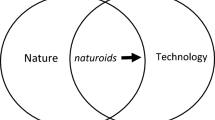Abstract
Is logic, feasibly, a product of natural selection? In this paper we treat this question as dependent upon the prior question of where logic is founded. After excluding other possibilities, we conclude that logic resides in our language, in the shape of inferential rules governing the logical vocabulary of the language. This means that knowledge of (the laws of) logic is inseparable from the possession of the logical constants they govern. In this sense, logic may be seen as a product of natural selection: the emergence of logic requires the development of creatures who can wield structured languages of a specific complexity, and who are capable of putting the languages to use within specific discursive practices.
Similar content being viewed by others
References
Béziau, J.-Y. (eds): Logica Universalis. Birkhäuser, Basel (2005)
Boghossian P.: Knowledge of logic. In: Boghossian, P., Peacocke, C. (eds) New Essays on the A Priori., pp. 229–254. Clarendon Press, Oxford (2000)
Brandom, B.: How Analytic Philosophy has Failed Cognitive Science. In Brandom: Reason in Philosophy. Harvard University Press, Cambridge (2009)
Cohn P.M.: Universal Algebra. Reidel, Dordrecht (1981)
Cook R.T.: What’s wrong with tonk(?). J. Philos. Logic 34, 217–226 (2005)
Davidson, D.: On the very idea of a conceptual scheme. In: Proceedings and Addresses of the American Philosophical Association, vol. 47 (1974) [Reprinted in Davidson: Inquiries into Truth and Interpretation, pp. 183–198. Clarendon Press, Oxford (1984)]
Fodor J.A.: The Language of Thought. Cromwell, New York (1975)
Grätzer G.: Universal Algebra. Springer, Berlin (1979)
Hanna R.: Rationality and Logic. MIT Press, Cambridge (2006)
Horwich P.: Stipulation, meaning and apriority. In: Boghossian, P., Peacocke, C. (eds) New Essays on the A Priori, pp. 150–170. Clarendon Press, Oxford (2000)
Kleene S.C.: Mathematical Logic. Wiley, New York (1967)
Koslow A.: A Structuralist Theory of Logic. Cambridge University Press, Cambridge (1992)
McGee V.: A counterexample to modus ponens. J. Philos. 82, 462–471 (1985)
Peregrin J.: The ‘Natural’ and the ‘Formal’. J. Philos. Logic 29, 75–101 (2000)
Peregrin J.: Developing Sellars’ semantic legacy: meaning as a role. In: Wolf, P., Lance, M.N. (eds) The Self-Correcting Enterprise, pp. 257–274. Rodopi, Amsterdam (2006)
Peregrin, J.: Consequence and inference. In: Kolman, V. (ed.) Miscellanea Logica: Truth and Proof, pp. 1–18. Philosophical Faculty of the Charles University, Prague (2006). http://www.miscellanea-logica.info
Peregrin J.: Logical Rules and the a priori: good and bad questions. In: Béziau, J.-Y., Costa-Leite, A. (eds) Perspectives on Universal Logic, pp. 111–122. Polimetrica, Italy (2007)
Peregrin, J.: Semantics without meaning? In: Schantz, R. (ed.) Prospects of meaning. de Gruyter, Berlin (2010, to appear)
Prior, A.N.: Runabout inference ticket. Analysis 21, 38–39 (1960/1961)
Pritchard, D. B.: The Encyclopedia of Chess Variants. Games and Puzzles Publications, Surrey (1994)
Schechter J., Enoch D.: Meaning and justification: the case of modus ponens. Noûs 40, 687–715 (2006)
Sellars, W.: The myth of the given: three lectures on empiricism and the philosophy of mind. In: Feigl, H., Scriven, M. (eds.) The Foundations of Science and the Concepts of Psychology and Psychoanalysis (Minnesota Studies in the Philosophy of Science 1), pp. 253–329, University of Minnesota Press, Minneapolis (1956)
Sellars, W.: In the space of reasons: selected essays. In: Scharp K., Brandom, R. (eds.) Harvard University Press, Cambridge (2007)
Wansing H.: Connectives stronger than tonk. J. Philos Logic 35, 653–660 (2006)
Wittgenstein, L.: Bemerkungen über die Grundlagen der Mathematik. Blackwell, Oxford (1956) [English translation Remarks on the Foundations of Mathematics, Blackwell, Oxford (1956)]
Author information
Authors and Affiliations
Corresponding author
Additional information
Work on this paper was supported by the research grant of the Czech Science Foundation No. P401/10/1279.
Rights and permissions
About this article
Cite this article
Peregrin, J. Logic and Natural Selection. Log. Univers. 4, 207–223 (2010). https://doi.org/10.1007/s11787-010-0018-x
Received:
Accepted:
Published:
Issue Date:
DOI: https://doi.org/10.1007/s11787-010-0018-x




